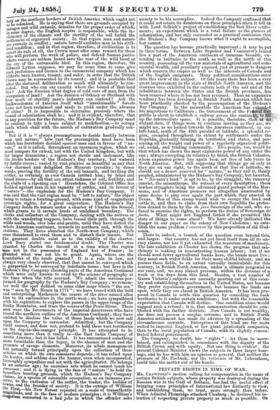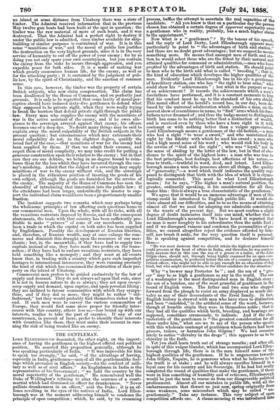PRIVATE RIGHTS IN TIME OF WAR.
MR. CRAWFORD'S motion calling for compensation in the name of certain British subjects, whose property was destroyed during the Russian war in the Gulf of Bothnia, has had the useful effect of bringing some principles of international law distinctly to view, and establishing them, we trust, more strongly than before. When Admiral Plumrid,ge attacked 171eaborg ; he declared his in- tention of respecting private property as much as possible. Oa
an island at some distance from Uleaborg there was a store of timber. The Admiral received information that in the previous May twelve gun boats had been built at the spot in question ; the timber was the raw material of more of such boats, and it was destroyed. That the Admiral had a perfect right to destroy it under the public law is admitted, since timber available for ship- building or similar purposes is contraband of war. It is in this sense "munitions of war," and the moral of public law justifies the destruction on the very highest grounds, since it is in the very service of humanity to cut off the power of your enemy ; for by so doing you not only spare your own countrymen, but you restrain the enemy from the risks he incurs through aggression, and you expedite peace for both sides. It is a mode of making war which greatly economises human life, for the enemy, as well as for the attacking party; it is sustained by the judgment of pub- lic law, by the spirit of Christianity, and the sanction of common sense.
In this case, however, the timber was the property of certain British subjects, who now claim compensation. The claim has been disallowed by- the House of Commons, and on perfectly just grounds.. It is only to be regretted that some laxity of moral per- ception should have induced sixty-five gentlemen to defend what they supposed to be private right, when they were really trying to break the barriers that defend private right through the public law. Every man who supplies the enemy with the munitions of war is the active assistant of the enemy, and if he owes alle- giance to the sovereign arrayed against that enemy, his offence becomes one of a deep dye. No doubt many, things may be said to explain away the moral culpability of the British subjects in the present question ; but circumstances which may extenuate their moral culpability do not, in the slightest degree, qualify the broad fact of the ease,—that munitions of war for the enemy had been supplied by them. If then we admit their excuses, and acquit them of moral complicity, we may take credit for putting a generous construction upon their relation to the enemy ; but in that case they are our debtors, we being in no degree bound to reim- burse them for the loss which they have incurred through the ene- my's misdoing. Admit that the subject of a sovereign may supply munitions of war to the enemy without risk, and the sovereign is placed in the ridiculous position of insuring the goods of his own subject, although the goods are famished for the service of the enemy. The majority of the House of Commons has seen the absurdity of introducing that innovation into the public law; if the attendance had been larger, undoubtedly the muster to sup- port the individual claim would have been a proportionately smaller fraction.
The incident suggests two remarks which may perhaps bring the wholesome principles of law affecting such questions home to our commercial men. Upon the whole, with all its risks, with all the vexatious restraints imposed by Russia; and all the consequent abatements, the trade with that country has been sufficiently pro- fitable to make " princes" of some of our merchants. It has been a trade in which the capital on both sides has been supplied by Englishmen. Possibly the development of Russian liberties, and, therefore, of Russian wealth, may at once enlarge the com- merce and diminish this draught upon the resources of our mer- chants; but, in the meanwhile, if they have had to supply two capitals instead of one, they have made two profits on the trans- action; if they have had to endure vexatious restraints, they have held something like a monopoly ; and they must at all events know that, in trading with a country which gave such imperfect hostages to international intercourse, they were running precisely the kind of risk which has occasioned the destruction of their pro- perty on the island of Uleaborg. Commercial men profess to be guided exclusively by the law of supply and demand. They do not always act upon that rule, since it is not in human nature to do so always ; they act upon imagi- nary supply and demand, upon caprice, and upon personal liking ; they are inclined to favour communities with which they sympa- thise, and if they did so more, they might be rather ' old- fashioned," but they would probably find themselves richer in the end. If such men were to survey the various communities of Europe, they would find some more proper for friendly inter- course with this country, others less so,—less bound up with our interests, readier to take the part of enemies. If any of our countrymen, in pursuit of lucre, prefer to identify their interests with countries like these, they must make their account in run- ning the risk of being treated like an enemy.



























 Previous page
Previous page